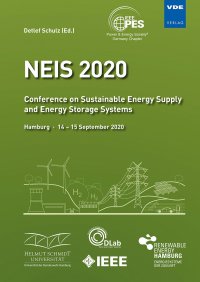Development of an Operational Strategy for Hybrid Power Plants Consisting of Battery Energy Storage System and Wind Farm to Enable Stacked Applications
Conference: NEIS 2020 - Conference on Sustainable Energy Supply and Energy Storage Systems
09/14/2020 - 09/15/2020 at Hamburg, Deutschland
Proceedings: NEIS 2020
Pages: 6Language: englishTyp: PDF
Authors:
Witzke, Dennis (University of Applied Sciences Hamburg, Hamburg, Germany)
Wieland, Marco; Alhaider, Firas (Vattenfall Europe Innovation GmbH, Hamburg, Germany)
Abstract:
In 2021, subsidies for the first large scale renewable energy resources (RES) will expire in Germany. Beyond that, Germany introduced a new innovative tendering scheme for RES called “Innovationsausschreibungen” which inter alia subsidises asset combinations. Today, diverse approaches exist to enable the integration of Lithium-Ion (Li-Ion) Battery Energy Storage Systems (BESS) into power grids. These focus either on the combination of generation assets with Li-Ion BESS providing one application or BESS providing several applications in stand-alone scenario. In this paper, the combination of applications in a co-location scenario to a wind farm is investigated techno-economically. An operational concept is developed and applied to a reference Hybrid Power Plant (HPP). This pilot plant was installed in course of the research project ‘Norddeutsche Energiewende 4.0’ (NEW4.0) and consists of a 12.6 MW wind farm and 720 kW / 792 kWh BESS. Behind-the-meter setting of BESS in this pilot plant requires special attention to current German regulation and state induced mark-ups on electricity. Applications that have been considered for the operational concept are frequency containment reserve, energy arbitrage and self supply of the wind farm. Simulation is carried out by a newly developed MATLAB tool. Simulations show that BESS can increase the reference HPP annual profits by 2.7 %. BESS may add another opportunity to RES that run out of subsidy period after 20 years and secure profitability and operation beyond depreciation period. In the ‘behind-the-meter’ configuration, current regulation in Germany allows utilization of energy from RES for BESS operation only. Thus, it is investigated at which BESS/wind farm power ratio HPP profits are maximized. This field of tension between BESS availability and BESS/wind farm power ratio cannot be resolved.


